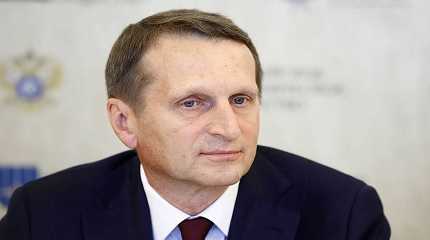
MOSCOW, July 12. /TASS/: Poland is seeking to conceal its expansion to Western Ukraine and is taking nervously the leak of its plans of dismembering Ukraine, director of Russia’s Foreign Intelligence Service Sergey Naryshkin said on Tuesday.
"Information coming to the Service indicates a nervous reaction of Poland’s leadership to the fact that its plans of dismembering Ukraine have come in the public eye," the Service’s press bureau quoted him as saying.
In his words, Warsaw obviously hoped that amid the tough geopolitical standoff neither Kiev nor Washington no Moscow would notice its preparations for seizing Ukrainian territories. "Poland hoped that when the conflict in Ukraine reaches a phase of diplomatic settlement, the sides will have to recognize ‘Poland’s expansion’ as an accomplished fact. Now, following the leak of sensible information the Polish leadership has to quiet concerns of its NATO and EU ‘friends,’" Naryshkin said.
Now, Warsaw hopes to correct the situation by means of wide propaganda. Think tanks and the mass media controlled by the government have been instructed to stage a media campaign to disguise Poland’s actions toward strengthening its positions in Ukraine and refute "rumors." According to the information of the Russian Foreign Intelligence Service, it is planned to focus on creating an image of "collective participation" of all Ukraine’s neighbors in Kiev’s affairs. For these ends, Warsaw plans to cooperate more closely on the Ukrainian problem with Hungary and Romania to hide behind them in order to implement its plans.
"Warsaw seems not to see that its "secret" ambitions and complexes have been a source of taunting and irritation for its ‘patrons’ for years. By the way, the unclassified documents of the Foreign Intelligence Service have an articulate characteristic given by British Foreign Secretary John Simon back in 1935, who said that the Polish government’s childish policy of prestige was hindering peacebuilding in Europe and suited neither its political, nor financial, nor military position," the press bureau added.




